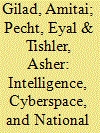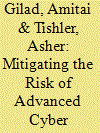|
|
|
Sort Order |
|
|
|
Items / Page
|
|
|
|
|
|
|
| Srl | Item |
| 1 |
ID:
177824


|
|
|
|
|
| Summary/Abstract |
This study evaluates military intelligence as the process of data collection and knowledge development and assessment for decision-making by the military and other governmental agencies. We argue that dominance in modern warfare is enabled by human and technological intelligence that uncovers the rivals’ capabilities and intentions, increases the effectiveness of the country’s own weapon systems, and facilitates the development of high-quality defense systems. Hence, gathering and evaluating intelligence is essential for countries involved in conflict or exposed to terror threats. We focus here on the strategic and tactical implications of intelligence in the context of an arms and intelligence race between two rivals. We present and assess models that show how security agencies in countries in a state of conflict (with other countries and/or non-country entities) should invest in developing their own intelligence capabilities to ensure adequate military (security) capabilities, national security, and welfare. Since advanced cyber attackers can infiltrate almost all complex computer networks to gather intelligence (and/or cause other harms), we show how countries can establish procedures and determine the budgets to optimally allocate cyber-defense resources to prevent harmful cyber-attacks on the complex computer networks that manage their infrastructure, business, security, and government operations.
|
|
|
|
|
|
|
|
|
|
|
|
|
|
|
|
| 2 |
ID:
192046


|
|
|
|
|
| Summary/Abstract |
Modern countries employ computer networks that manage organizations in the private and public sectors. Cyber-attacks aim to disrupt, block, delete, manipulate or steal the data held in these networks, which challenge these countries’ national security. Consequently, cybersecurity programs must be developed to protect these networks from cyber-attacks in a manner that is similar to operations against terrorism. This study presents several models that analyze a contest between a network operator (defender) that deploys costly detectors to protect the network and a capable cyber attacker. Generally, when the deployed detectors become more potent or the defender exhibits higher vigilance, the attacker allocates more resources to R&D to ensure that the attack remains covert. We show that detectors may be substitutes, complements, or even degrade each other, implying that defenders must account for the cyber weapons’ characteristics and the attacker’s profile and strategic behavior. We derive the optimal number of detectors when the attacker’s R&D process features R&D spillovers and show that targeted detectors act as deterrents against high-quality weapons only if the attacker’s budget is not substantial. Finally, we demonstrate that common cybersecurity practices may be detrimental from a social-welfare perspective by enhancing an arms race with the attacker.
|
|
|
|
|
|
|
|
|
|
|
|
|
|
|
|
|
|
|
|
|